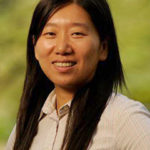junior faculty teaching fellow spotlight:yaqiong xu
each month, the cft newsletter highlights the work of our junior faculty teaching fellows. this month, yaqiong xu, assistant professor of electrical engineering and physics, talks about her teaching philosophy and interests:
i joined vanderbilt in september 2009 as a tenure-track assistant professor who is jointly appointed in the departments of electrical engineering & computer science (51%) and physics & astronomy (49%). my research interest is investigation of nanoscale electrical, optical, and mechanical interactions between carbon nanotubes/graphene and different biomolecules/biosystems/nanoparticles. i have taught eece 301, introduction to solid state materials. this is a “gateway” course that attracts students with a range of preparation. this presents a challenge, as the highly prepared students are likely to believe that the course moves too slowly, while the least highly prepared can feel overwhelmed if not provide sufficient background. in addition, i have developed a new course phys 266/366, experimental nanoscale fabrication and characterization.
“other than lectures, half of the class time will be devoted to hand-on experience in cleanroom, presentations, interactive discussion, and a long-term group project, related to both recent papers and the students’ creative ideas.“
this course is designed for students having diverse backgrounds from physics, chemistry, electrical engineering, chemical engineering, mechanical engineering, materials science, to biomedical engineering. in this course, i will introduce the basic principles of the most recent cutting-edge nanoscience and nanotechnology in engineering, physics, chemistry, and biology. other than lectures, half of the class time will be devoted to hand-on experience in cleanroom, presentations, interactive discussion, and a long-term group project, related to both recent papers and the students’ creative ideas. from this course, students will not only get an important contextual understanding of their fields, but will be given the tools to collaborate and seek out knowledge on their own.


leave a response